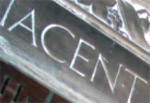 |
|
|
More on the presidents’
ashes
It’s true that the reflexive possessive (in this case SUORUM) ought to point to the subject of the sentence (in this case CINERES), but in practice it has other uses. Most important, the reflexive points to what grammarians call “the subject of discourse” (i.e., what the speaker or writer considers most important). The classic example is: SOCRATEM CIVES SUI INTERFECERUNT—“His (Socrates’) own (fellow) citizens killed Socrates,” in which the grammatical subject of the sentence is CIVES, while the object is SOCRATATEM. Far from being otiose, the -QUE preserves the fine idiomatic feel of this construction; the SUORUM might be confusing without it. This is hardly fine-grained philology; anyone accustomed to reading inscriptions in churches, museums, or libraries is comfortable with the sort of thing you quote. It is common for possessives to indicate family or friends without substantives (we see this in the Romance languages even today: cf. It. “parliamo con i miei”—“we’re talking to my family”). This is especially true of the reflexive (which may also point to “soldiers,” “slaves,” or anything distinctly one’s own). Wells S. Hansen, AM’88
|
|
phone: 773/702-2163 | fax: 773/702-8836 | uchicago-magazine@uchicago.edu


